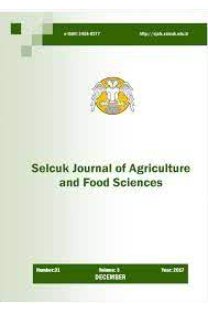İki Şeker pancarı Çeşidinde Farklı Azot Dozlarının Yaprakbiti (Homoptera:Aphidoidea) Populasyon Gelişimine Etkisi
Konya ili Altinekin ilçesinde 1999 yilinda yürütülen bu çalismada monogerm ve triploid iki sekerpancari çesidi
(Eureka ve S-814) ile 4 azotlu gübre dozunda (0 , 15 , 25 ve 35 kg/da) yaprakbiti populasyon gelisimi izlenmistir.
Deneme tesadüf parsellerinde faktöriyel deneme desenine göre 3 tekerrürlü olarak planlanmistir. Sonuçta , sekerpancarinda
koloni olusturan iki yaprakbiti türünden Aphis fabae Scop. % 91 bulunus orani ile baskin tür olarak
belirlenmis , Myzus persicae Sulz. ise toplam yaprakbiti populasyonunun ancak % 9 ‘ unu olusturmustur. Yaprakbiti
populasyonu hemen bütün parsellerde bitkilerin 7-8 yaprakli oldugu Haziran basinda baslayip , yaprak sayisinin
maksimuma (15-20 yaprakli dönem) ulastigi Temmuz ortasinda en yüksek noktaya çikmistir. Populasyon , yüksek
sicakliklarin basladigi Agustos basinda iyice azalip , Agustos ortasinda tamamen yok olmustur. Iki sekerpancari
çesidinden S-814 , A. fabae tarafindan daha çok tercih edilmektedir (P < 0,01). A. fabae ve toplam yaprakbiti
populasyonu artan azot dozlarina paralel olarak yükselmektedir (P<0,05). Toplam afit populasyonu 229,67 + 16,65
birey/bitki ile S – 814 çesidi ve 35 kg/da dozunda en yüksek, 55 + 10,58 birey/bitki ile Eureka çesidi kontrol parselinde
en düsük olmustur. Çok etkin bir virus vektörü olan M. persicae sayisinda ise muhtemelen düsük populasyonuna
bagli olarak çesitler arasi farklilik önemsiz iken azot dozlari bakimindan ise sadece hiç azot verilmeyen kontrol
parseli ile en yüksek azot dozu verilen parsel arasindaki farklilik önemli bulunmustur (P<0,05). Sonuç olarak , sekerpancarinda
yaprakbiti populasyonunun sinirlanmasi bakimindan yetistiricilere 15-20 kg/da dozunun üstünde
azotlu gübre kullanilmamasi tavsiye edilmelidir.
Anahtar Kelimeler:
Sekerpancari çesitleri, Aphis fabae, Myzus persicae, azot dozlari, populasyon gelisimi, Türkiye
The Effect of Different Nitrogen Doses in Two Sugar Beet Varieties on Population Development of Aphids (Homoptera:Aphidoieda)
Population developments of aphid species on two sugar beet varieties, Eureka (monogerm) and S-814 (triploid),
fertilized with four different nitrogen doses (0, 15, 25, 35 kg/da) were surveyed in Altinekin – Konya province of
Turkey. The experiment was completely randomized design with three replications. The survey revealed that the
sugar beet varieties were harbored only two aphid species under given experimental conditions. The most common
species was Aphis fabae Scop. with a relative frequency of 91%, while Myzus persicae Sulz. was relatively less
abundant (9%) in the sampled areas.
In almost all plots, the first aphid occurrence was observed at the beginning of June, which coincides with 7-8
leaf stages of sugar beet varieties. The aphid populations peaked around mid July when the leaf number was maximum
(15-20 leaf stage) for sugar beet. Then the populations gradually declined until the beginning of August probably
due to increase in air temperature, and completely collapsed by mid August.
The abundance of A. fabae on variety S-814 was more than that of Eureka (P<0,01). Both A. fabae and total
aphid population were parallely increased with increasing nitrogen doses (P<0,05). The highest number of aphid
(229,67 + 16,65 aphid/plant) was found on variety S – 814 fertilized at 35 kg/da rate, whereas variety Eureka on
control plots harbored the lowest number of aphids (55 + 10,58 aphid/plant). For M. persicae, an effective virus
vector, while the differences between varieties were not significant, only the difference between unfertilized and
highest nitrogen dose were statistically important (P<0,05). Overall, due to aphid tendency toward nitrogen rich
plots, fertilization over 15-20 kg nitrogen/da was not suggested to control aphid population growth in sugar beet
fields.
Keywords:
sugar beet varieties, Aphis fabae, Myzus persicae, nitrogen doses, population development, Turkey,
- ISSN: 2458-8377
- Yayın Aralığı: Yılda 3 Sayı
- Başlangıç: 2002
Sayıdaki Diğer Makaleler
Hububat Ekiminde Tohum ve Gübreyi Farklı Sıraya Veren Kombine Ekim Makinasının Tasarımı
Tamer MARAKOĞLU, Mustafa KONAK
Bilgisayar Kontrollü Yüksek Hassasiyetli Santrifüj Pompa Deney Ünitesinin Gerçekleştirilmesi
Emine ATALAY, Sait GEZGİN, Mehmet BABAOĞLU
Buğday Ruseymi ve Fitaz İlavesiyle Besin Değeri Yüksek Yoğurt Üretimi
Serpil YALÇINKAYA, Ahmet AYAR, Adem ELGÜN
Meryem ELMALI UYSAL, A Faik YILDIRIM
Narince Üzüm (Vitis vinifera L.) Cibresi Extratının Antibakteriyal Etkisi
Gülcan ÖZKAN, Osman SAĞDIÇ, Nilgün GÖKTÜRK BAYDAR
Konya Kenti Tarihi Merkezinin Açık ve Yeşil Alan Niteliğinin İrdelenmesi
